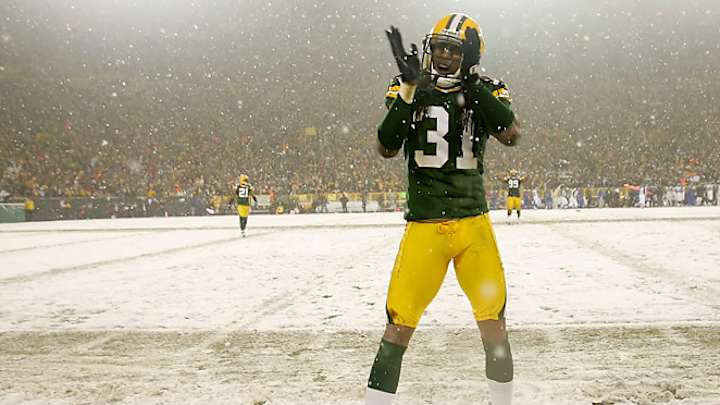Former CB Al Harris retires as a Green Bay Packer

Al Harris didn't know how a ceremonial retirement was supposed to work and he didn't really care. All that mattered to the two-time Pro Bowl cornerback was that he was somehow able to say he retired as a member of the Green Bay Packers.
"Just over my career I had an awesome time, but the better part of my years were in Green Bay, (so) it was just important to me to retire as a Packer,'' Harris said Thursday, nearly 3 1/2 years since he played his final snap for the Packers. "I had a great experience in Philadelphia, great experience in Tampa and everywhere else I played, but Green Bay is a special place to play football.''
Harris, now an assistant coach with the Kansas City Chiefs, said he came up with the idea the day he announced his retirement in December 2011 while playing for the St. Louis Rams.
He spent 14 seasons in the NFL after entering the league as a sixth-round draft pick by Tampa Bay out of Texas A&M-Kingsville in 1997. Harris spent his first season on the practice squad, then the next five years with the Philadelphia Eagles before being traded to the Packers. He arrived in Green Bay in 2003 and quickly became a fan favorite for his fierce man-to-man pass coverage and physical style of play.
He never missed a game during his first 10 NFL seasons, but in 2008 he suffered a ruptured spleen that was initially supposed to end his season. Instead, he missed just four games and ended up playing 12 games that year.
His final game in Green Bay came on Nov. 22, 2009, when he tore the anterior cruciate ligament, the lateral collateral ligament, the IT band, the fibular collateral ligament and the lateral hamstring in his left knee against the San Francisco 49ers">49ers. He began the 2010 season on the physically unable to perform list while coming back from the knee injury, but he was waived and never activated that season. The Packers went on to win the Super Bowl and Harris received a Super Bowl ring from the team.
He played for the Dolphins and caught on with the Rams, finishing the 2011 season with 20 tackles, seven pass breakups and a fumble recovery. By all accounts, he was playing well when he suffered his second torn ACL, this time in his right knee.
"I knew I was on the clock. Your body can only take so much,'' Harris said. "I looked at it as God telling me, `OK, it's time to turn the page.' I didn't have any problems struggling to say, `Do I want to play?' I knew exactly what I wanted to do, and that's the path I went with.''
That path has led him to coaching, which in turn has given him a greater appreciation for his defensive coordinators -- particularly Emmitt Thomas and Jim Johnson in Philadelphia and Ed Donatell, Bob Slowik, Jim Bates, Bob Sanders and Dom Capers -- and what he put them through.
"God bless every coordinator that ever had to deal with me,'' Harris said with a laugh. "Some of them I may have made their job easy, and some of them I might've made their jobs hard, just with the style of play I played with.''
Harris said he first started seriously considering coaching after a conversation with former Packers cornerbacks coach Lionel Washington. After his second ACL injury, then-Rams coach Steve Spagnuolo allowed Harris to attend defensive coaches meetings, and he interned last summer with the Dolphins, coached by former Packers offensive coordinator Joe Philbin. In Kansas City, Harris has been reunited with Andy Reid, his head coach with the Eagles.
"I reached out to Andy, I called to congratulate him, and I kind of let him know what I was thinking,'' Harris said. "He let me know what he was thinking and we went from there.''
Harris said he's happy to be entering this new phase of his life and has "no regrets at all'' about his playing career or how it ended.
"Guys have problems when they can't face the facts. When you can't do it anymore, you can't do it anymore,'' Harris said. "The one thing you don't want to do is you don't want to leave the game and think that you still had something left in the tank. When you've emptied your tank, you're at peace with yourself. I emptied my tank.''
